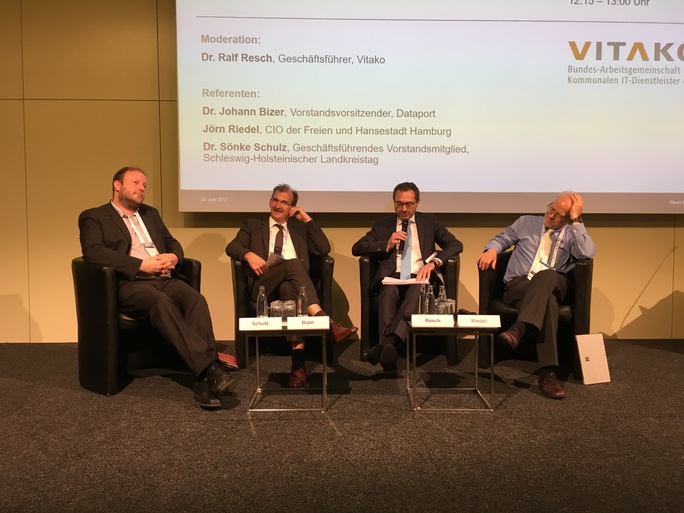Vitako at the German national congress for the future of state and governance

This week, Vitako hosted several events during Zukunftskongress, the German national congress for the future of state and governance which was held in Berlin on June 20th and 21st, dealing with very current topics.
“Is our law digital ready?” was a question, discussed by our experts Jörn Riedel (CIO in the city and state of Hamburg), Johann Bizer (head of the managing board of Dataport) and Sönke Schulz (managing director of the county association in the state of Schleswig-Holstein). They were discussing topics like how – under the condition of applicable German law – public authorities can collect citizen data only once and reuse it. Another question was if it might be feasible to generally abolish the need for written forms or to establish a digital by default principle. Actually, we had a lively discussion about the appropriate law for establishing seamless eGovernment processes (should regulations better be put in administrative law or in eGovernment law?). Last but not least we had a talk about the idea of combining registries like registers of residence and registers of birth, marriages and death. Jörn Riedel suspected that changing applicable regulations would take too much time. Instead, Hamburg chose a different way and is currently working on a solution for an efficient use of personal data. The idea is to indicate users of the Hamburg government portal which data already exists and asking the applicants if they allow the usage of exactly this data.
Our second workshop dealt with practical experiences launching electronic files in municipal administrations. German law requires several procedures to allow electronic scans of documents in order to substitute paper documents. Vitako worked on guidelines for municipalities to implement the regulations which were set up by the German Federal Office for Information Security. Vitako and KGSt currently published their guidelines in order to support electronic scans and to help implementing electronic files in public authorities.
Cyber security was a very up do date topic in our third event. “Hacks and threats – from A to Z” dealt with threats for municipal data collections. Vitako board member Reinhold Harnisch presented measures for preventing, defense and control. He pleaded for stronger relationships and better communication among municipalities. Better efforts for standardized interfaces in public authorities may also help to tackle the risks. Veit Starke from Kaspersky presented latest trends in cyber-attacks. In his analysis it turned out, that employees are often the weakest point in a safety system and have to be encouraged for further training. Besides that, constantly updating security patches should be taken for granted.